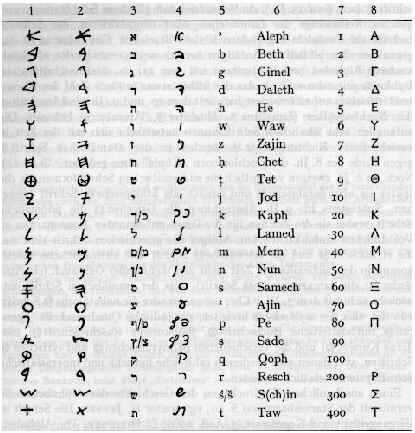To: malakhi; dangus; SoothingDave
The Hebrew scriptures are written without vowels because that is the way Semitic languages are written. Hmmm .. Paleo-Hebrew had vowels. It also used letters that look Greco-Phoenecian, and not the standard Aramaic.
Take a look at the alphabets.

1=North Semitic alphabet (Paleo-Hebrew); 2=Earliest Greek character (9th-6th centuries BC; 4-5 Eastern branch (4. Ionic; 5. Attic); 7=Western branch; 9=Classic Greek; 10=Names of the letters (those in parentheses; names of letters now discarded in classic Greek.
Aramaic, Hebrew, and Greek alphabets.

Are "aleph" (a), "he" (e), "jod" (i), "ajin" (o) not vowels?
Of course, considering the manuscripts are all in standard Hebrew and not Paleo-Hebrew, obviously we know that IF they were written prior to the Babylonian Captivity that they were translated into a new alphabet and updated language at that time.
To: Hermann the Cherusker
Are "aleph" (a), "he" (e), "jod" (i), "ajin" (o) not vowels? That is precisely correct. In Hebrew, these are consonants, not vowels.
aleph is a silent gutteral.
he is actually an "H", not an "E".
yod is a "Y", not an "I".
ayin is also a silent or barely aspirated gutteral.
In written Hebrew, vowel sounds may be added by the use of dots and dashes -- called "points" -- to clarify pronunciation. They are written either above, below, or inside the letter. Some of these are for vowels. Others indicate whether, for example pei has a "P" or an "F" sound. In Torah scrolls used in synagogues, the text is unpointed. This is true as well for modern Hebrew. Most written Hebrew in Israel is written without vowels indicated.
139 posted on
11/04/2003 1:23:37 PM PST by
malakhi
(Thy word is a lamp unto my feet, and a light unto my path.)
To: Hermann the Cherusker
Are "aleph" (a), "he" (e), "jod" (i), "ajin" (o) not vowels? Aleph and ayin are silent consonants; I don't know what the sound of aleph was, but ayin remains in one dialect (Yemenite?) pronounced as a glottal catch. 'He' is not e but h, pronounced like h. Yod corresponds to y. When the Greeks adopted the alphabet from the Phoenicians, they used letters representing sounds they didn't have to represent the vowels they needed.
147 posted on
11/04/2003 1:46:22 PM PST by
maryz
FreeRepublic.com is powered by software copyright 2000-2008 John Robinson

